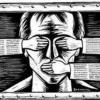Leaderboard
Popular Content
Showing content with the highest reputation on 07/16/21 in all areas
-
This is a really good and difficult question. I consider myself to be a rather rational person and as such, I would consider even books like "Mein Kampf" as source material. I was taught in school that the book, while present in almost all households at the time, was actually read by only a very small portion of the populace. If more people had read it and understood what was proposed in the book, Hitler might have had far fewer followers than he actually had. Protocols of the Elders of Zion was unknown to me before your post. This is more difficult in that it is based on fake and fictional texts, but the intent of the book seems to be furthering the antisemitic narrative. I am not sure in how far this book calls for violence, so I cannot really tell how I would classify it. Books are generally more difficult to classify, because they have to be read and interpreted and especially the interpretation can vary from reader to reader. Ideally, during their discourse people would notice that a book calls for violence and decide against it; finding a reason why the call is in there and realising that it contradicts a respectful together and/or human rights. This is at least how I would handle books. Unfortunately, as said before the interpretation can go other ways as well and further an aggeressive reasoning. As for a test whether a speech triggers violence, I have none. The correlation would be the only suggestion I have, but this has two important faults: it can only be done in hindsight, so it is too late anyway and you cannot transfer this to other speeches and, as discussed at length here, a speech alone is never the only reason for violence. It can be a factor that added to the general atmosphere of aggression, but it will never be the sole cause. For the examples you brought up: speeches, which explicitly advocate violence, would definitely fall under this label (and if I am not mistaken are already covered by the law). Critisism is much more difficult, because in this case the question how it is delivered is very important. It makes a huge difference, if you say "Child marriage is bad and should be abolished by this group." or if you say "These people are child fucking pedofiles and don't deserve to live." In many cases you can see a difference between critisism that tries to start a dialogue and critisism that wants to antagonise the other side. The latter is of course more likely to further aggression and violence against the other side, but as I said it can only be a factor, never the sloe reason. EDIT: I just thought of another reason, why it is so difficult to correlate speeches and violence: You can never verify that the violence would have occured without the speech. You are stuck with the situation that includes the speech and cannot see the outcome of the same situation without the speech. In some cases (like the video Lowenz posted) the violent people will cite the speeches or name the author of the speech, which clearly shows a connection, but as said before the speech will always be a factor of many.3 points
-
Could not agree more. Here comes his hearbreaking instrumental of "Life on Mars" (put into the show for a certain reason):2 points
-
Against the interest but sustaining their power fantasies. It's how you manipulate a tribal-minded right voter (in every state of this miserable world). And yes, they are happy with this, thanks to the criptospiritualism hidden behind right/far right ideologies.2 points
-
First to clarify something, apart from being an atheist, I am absolutely anti-cleric, I think that all religions are superfluous in this world. Of course, they are conservative by nature with their ancient dogmas, coming from people who slaughtered goats so that there are good harvests. I live in the south of Spain with a large population of Muslim immigrants and I know some of them and I know how they think. Many of them are less conservative and more tolerant than many fervent Catholics in Spain. The problems begin when governments, instead of being democratic, as we know it with all its defects, are replaced by theocracies that act and legislate strictly according to these 'holy scriptures'. Imagine living in a Catholic theocracy, it causes me nightmares just thinking about it. Example Iran in the 60-70 Today Same Afghanistan Not the muslims itself, the muslim goverments are the problem and their fanatic followers. To remember, the Vatican to this day has not yet signed the universal declaration of human rights, it has not condemned torture or the death penalty.2 points
-
I agree with what was said later on: "The Koran causes terrorism" and "Hate speech causes violence against minorities" is not comparable. It is the agressive interpretations of the Koran (which can be interpreted as similar, if not the same as hate speech) that causes terrorism. So, I would give the books a pass, the same I would give violent games, films or other media a pass. It is not the source material, but rather people interpreting it in a way that causes violence, that is the problems. This can be the Pope that incited people to go on the Crusades for Christianity or Imams that incite Muslims to terroristic acts. In a more secular context, it is public figures that blames certain groups for everything bad that is currently happening and inciting people to attack said groups. For me these are all comparable as well as condemnable. Al Andalus mentioned by Zerg Rush is a nice example that religions can live side by side in peace, if they respect each ohter. I am not sure what the reason for the attack by Christians was, but I would suppose it was either secular lust for power or a more violent interpretation of spreading your faith (which again I would interpret as inciting by religious leaders). Having thought more about it, I would agree that hate speech alone will not be enough to cause violence. You always need people that listen to it and heed the message. This works best on a fearful, frustrated, and insecure (?) mass of people. In the 3rd Reich Germany was recently destroyed in a war and had to pay reparations to other states. People were poor and frustrated and then a person appeared that told them that it was the Jews' fault and they are bad and should be eradicated. If the people would not have been in such a bad place, it is likely that the whole thing would not have worked. Similarly, today the target audience for hate speech (that actually causes violence) are mostly the poor, the unemployed, and/or the poeple frustrated with the current government (for whatever reason). Coming back to the question if, when, and how hate speech should be prohibited, I would say it is very difficult to say. It would be better to change the circumstances that cause hate speech to lead to violence, but in many cases these are very deeply rooted and cannot be changed on a whim. So, the next best thing to prevent violence is to remove speeches that trigger violence.2 points
-
2 points
-
A couple of permanently free games I can recommend. NaissanceE - https://store.steampowered.com/app/265690/NaissanceE/ An atmospheric first-person exploration platformer or something like that. It's a little barren, but there is just something very alluring about the abstract world. The sound-design is spot-on, from what I remember. I actually paid for it back in the day, it became free afterwards, but I can't say I regret it. Doki Doki Literature Club - https://store.steampowered.com/app/698780/Doki_Doki_Literature_Club/ This one is very popular, but still worth mentioning. A really creative short visual novel. A paid version was recently released, with various extras, but the free one still has the unchanged main experience. And a couple of others I have in my collection, but haven't played yet. We Were Here - https://store.steampowered.com/app/582500/We_Were_Here/ This is a co-op-only first-person puzzle game. Technically I have played this, for an hour, but most of it was trying to figure out why our progress wasn't being saved. So unless we solve that, it may end up an unfinished project. Seems like a fun game, though, based on the first impressions; "describe what you're seeing to me" kind of puzzle solving, as you and your co-op buddy are physically separated. It's also part of a series, but only the first one is free. Glitchspace - https://store.steampowered.com/app/290060/Glitchspace/ A first-person puzzle game, based on visual programming tasks. The steam reviews appear to be somewhat mixed, but I haven't actually read them, so can't really say anything other than it's free, and a genre I enjoy.2 points
-
On a lighter note (and because my holiday started today, oh yeah!), let's have a new thread for music, that you just enjoy and probably is not so well known...or somehow obscure but does not sound as strange as the songs we report in @STiFU's progessive music thread. Here is one of my new favourites, a similar recording of this track by other artists has been used in an US show broadcasted last year ( @Amadeus: What is the name of the show? )1 point
-
I find that a lot of people don't give Classical music much of a listen, but in this crowd that's probably not the case.1 point
-
1 point
-
@Amadeus Ah, interesting. I did not know that. Most probably because back then I bought it on the PS store. However, the best lines are: Poor Judd is dead He looks like he's asleep It's a shame that he won't keep But it's summer and we are running out of ice. ...let's include it in a readable in "HH: Eclipse" which I will start after "The Black Mage"!1 point
-
1 point
-
I think we're basically in agreement then. Speech that directly and explicitly advocates violence should not be, and generally isn't, protected as free speech. Linking other forms of speech to violence is too unreliable to form the basis of legal action, for the reasons you mentioned. Removing speech after the violence has happened is too late to protect the victim(s), and prosecuting the person who made the speech would be unjust because you would be punishing them for the behaviour of somebody else. Trying to censor speech in advance, on the other hand, involves guesswork and speculation about what might cause violence, which is unprovable and subject to the particular biases and prejudices of the censors. Indeed. This is why correlation fallacies are so dangerous. It's often the case that A happens before B but B could still have happened without A, which is why a mere sequence of events can never prove a causal relationship. Even using the claims of the violent criminals themselves are not reliable, because criminals very often try to blame other people for their actions. I've seen this before with anti-porn campaigners, who sometimes talk to convicted sex offenders who say "the pictures made me do it", then the campaigners accept this as fact and use it as justification for more censorship, without ever considering whether people in jail for sex crimes might have a strong motivation to find somebody else to blame.1 point
-
It's odd to me that you would, in an attempt to justify hate speech laws, compare them to a law which we now recognize to have been unjust and without valid justification. Laws against homosexuality are exactly the kind of laws states should not be allowed to make...ones where the state cannot justify making the behaviour illegal beyond vague statements about protecting society from "offensive" behaviour. In that way, they are precisely like hate speech laws. And while hate speech laws may eventually be recognized as obsolete and be repealed in the same way homosexuality was decriminalized, that's not an argument in their favour. If a law can't be justified, it shouldn't exist. Period.1 point
-
True. At the same time all laws require a degree of abstraction in order to be applied correctly. In principle all laws require a "good faith human analysis". That's why homosexuality criminalization laws eventually became obsolete and at the end they were repealed when society wouldn't resist it too much anymore. It's an evolutionary process. Something changes, disappears, other things remain the same.1 point
-
It compares well in price/perf to anything that isn't a desktop, probably better graphics than low-end desktops, and could be used as a mini PC with a dock.1 point
-
Another irony...while hate speech advocates list Nazis as one of their primary enemies, and point to Nazi Germany as what can happen if hate speech is allowed, the Nazi party was actually one of the most enthusiastic supporters of banning "problematic" speech...as all power-hungry proto-dictatorships are. This is exactly why preventing violence is not a sufficient argument for banning "hate speech". If you can't see the problem with making laws that require "good faith human analysis", where two reasonable people can't even agree on what is or is not against the law, I don't know what else to say. If we could rely on good faith, we wouldn't need laws at all.1 point
-
Too much for my liking, not in the current government, but in the opposition we have, which unfortunately is not a conservative and democratic opposition, but rather aligned with the extreme right. Instead of providing ideas or alternatives that can be debated, they only defame, obstruct and even sabotage government decisions, even against the interests of the own voters. They go with the motto: Either we rule or no one does.1 point
-
There seems to be some contradiction here (or maybe I just don't understand what you propose). On the one hand, you don't want to censor actual source material or media, such as religious books, films or video games. But on the other hand you want to censor "speeches that trigger violence". By "speeches" are you exclusively referring to actual public speeches made by politicians? What if the speech is recorded in a book, or posted online? Is Mein Kampf a speech or source material? What about Protocols of the Elders of Zion? At what point does a speech (worthy of censorship) become media or source material (which should be given a pass)? And what would be the test for whether a speech actually triggers violence? Hopefully not yet another correlation fallacy, like "a violent attack happened after a speech therefore it was caused by the speech". Would you restrict the scope of the law to speeches which directly advocate violence ("Go out and beat up these people, they are scum!") or is it sufficient to argue that criticising some group of people might encourage violence against those people (as modern hate-speech campaigners often do)?1 point
-
If the Koran contains passages that would qualify as hate speech, then yes, there's a conflict between the right to religious freedom and the rights of those who are targeted, just as with hate speech. Where a right conflicts with another right, it can no longer be automatically absolute. It's the task of society to find a consensus on whether there's a conflict, how severe it is and then what balance should be struck between them, based on the weight of each right. On the matter of the Koran, my understanding is that it should offer the faithful guidance on how they should lead their lives. It does say they should seek to spread Islam, but to my knowledge not by force or coercion, which as Destined says would be problematic in a society with human rights. Nor does it dehumanise unbelievers, which may have steered the faithful towards the use of such aggressive methods. And the concept of Jihad, as I remember it to be described in the Koran, is more of a spiritual process by which one should come closer to God. The idea of "waging" Jihad as a holy war on infidels seems to have come from those interpreting the text for their own selfish needs. That would seem to be the root of the problems that stem from the practice of religion. If a community attracts people who call others "cunts" and use racial slurs, I don't see how that community could thrive without getting them to tone it down or getting rid of them. A welcoming community is definitely thanks to its members, but moderation may be necessary to ensure it stays one. Fortunately the majority of insults I've seen here are more like your less severe examples, which I believe are considered tolerable in what is a mature community. There's no clear cut-off for when an interaction becomes unacceptable, but that's a cause for caution and discussion, not a reason to do nothing.1 point
-
1 point
-
Bear in mind that LOD system is very old, IIRC it was designed by Tels and never improved upon much since. Ideally, every entity except worldspawn should be able to use LOD, but it's not an ideal situation. And yeah, performance is still your responsibility. Either you get to know the engine and design maps to leverage its strengths or you will see players complaining, whether you like it or not.1 point
-
You're right, there is a certain parallel between "hate speech" and libel laws, which is why the over-broad drafting of libel laws can be similarly dangerous. In the US, which again is the "gold standard" for freedom of speech, libel is defined very narrowly, and convicting someone of libelling a public figure is extremely difficult. For example, it is not libellous to call someone an idiot, but it is libellous to falsely accuse them of being a convicted child molester. Under English law, libel and defamation is much easier to prove, and truth isn't even a defence, which means you can be convicted of libel even for saying something that is 100% true, if it is considered to damage the reputation of the plaintiff. Depends what you mean by "being held responsible". What free speech advocates want is the right to say anything without being punished by the government (or other powerful bodies). That is what free speech means: the right to speak freely. Not the right to say only nice things that everybody agrees with. If "being held responsible" just refers to subsequent criticism and condemnation when you say something ignorant or offensive, then that's perfectly fine. Free speech does not imply the right not to be criticised or called an idiot/bigot/arsehole for what you say. Quite possibly, but irrelevant. Free speech does not require "constructive dialogue", and the motivations of speakers are not a factor. A drunk, a schizophrenic, a raging narcissist, a university professor, a religious fundamentalist and a taxi driver all have exactly the same rights to speak freely, regardless of what they wish to say and why they want to say it. Again, true, but irrelevant to the issue of free speech. Personal attacks and aggression fall entirely within the remit of free speech, unpleasant as they may be. And as long as people choose to organise themselves into groups, and use those group identities as a cover to push for political change, other people should have the right to criticise and condemn (even in an insulting manner) the behaviour of those groups. Well you're perfectly entitled to your opinion. But it seems similarly obvious to me that hate speech laws have not achieved a single benefit to human society, and there is no evidence that even a single violent attack has been prevented by attempts to censor speech. People don't stop hating other people just because you delete their Facebook posts or arrest them for tweeting — in fact authoritarian behaviour by governments seems like a fantastic way to increase levels of hatred (against the government itself, or the people that the government claims to be protecting).1 point
-
An encounter with some rather unsavoury types is taking shape...1 point
-
0 points













